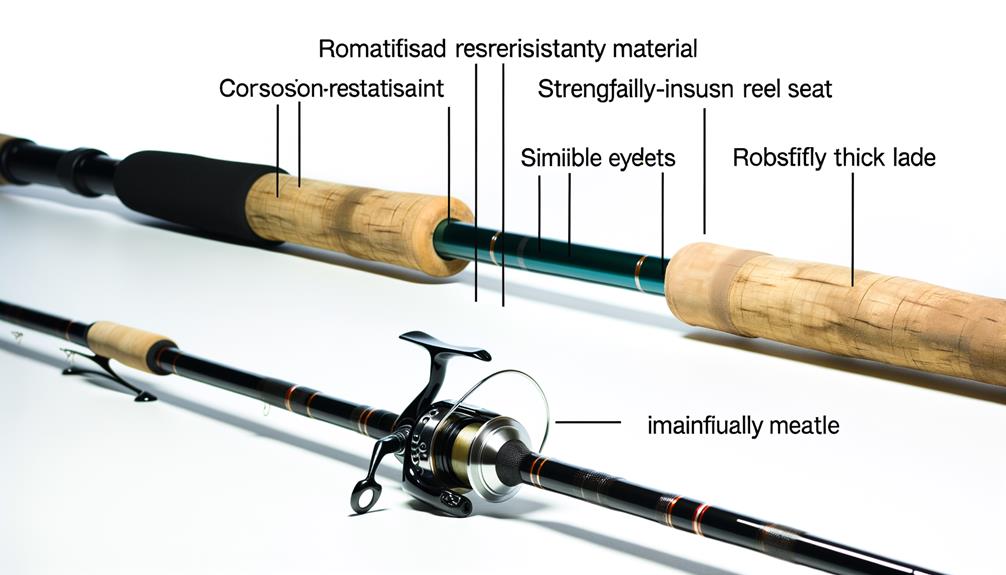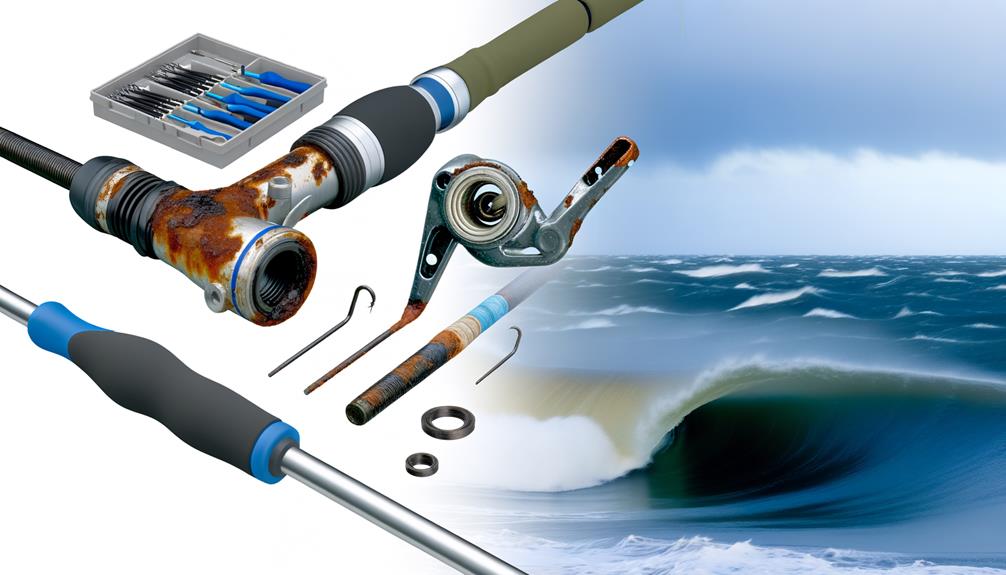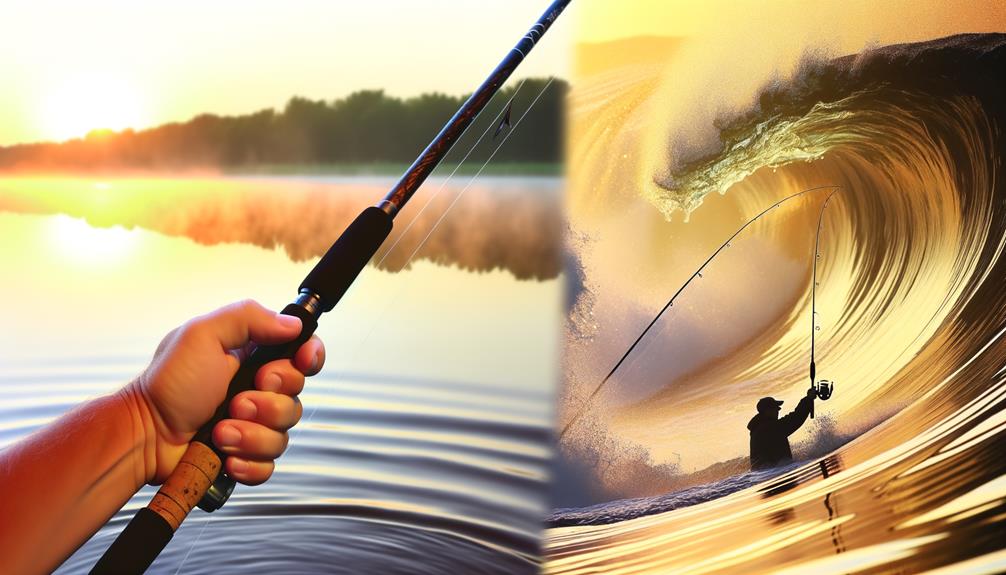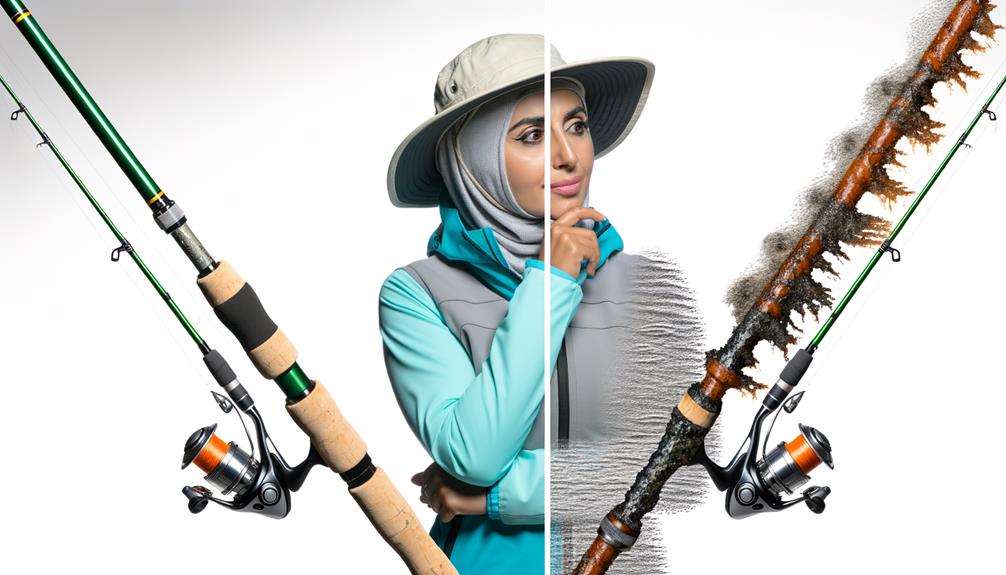The interchangeability of freshwater and saltwater fishing rods is a topic worthy of examination. The implications of using a freshwater rod in a saltwater environment, primarily concerning its potential for corrosion and durability, raise significant questions. Are the risks of a shortened rod lifespan and compromised performance enough to deter such practice, or could careful maintenance and cleaning mitigate these issues?
Moreover, does the type of fish targeted alter this equation? This discourse invites an exploration into the mechanics, materials, and maintenance of fishing rods, linked with the distinct characteristics of freshwater and saltwater environments and species.
Key Takeaways
- Freshwater fishing rods can be used in saltwater but may corrode due to lack of corrosion-resistant materials.
- Regular cleaning and drying after saltwater use can preserve a freshwater rod's lifespan.
- Freshwater rods are not designed for larger, stronger saltwater fish, possibly affecting fishing success.
- Using a saltwater rod in freshwater is safe and won't cause any damage to the rod.
Understanding Fishing Rod Basics
To fully comprehend the implications of using freshwater rods in saltwater, one must first understand the basics of fishing rod construction and materials. Fishing rods, whether freshwater or designed as saltwater gear, are meticulously crafted with materials that cater to their specific environments.
Freshwater rods, while efficient for their intended use, may not fare as well in saltwater due to their non-corrosive resistant construction. Conversely, saltwater rods are built with robust, corrosion-resistant materials like titanium and stainless steel, designed to withstand the harsh conditions of the sea.
Using a freshwater rod in a saltwater environment can accelerate corrosion, significantly reducing its lifespan. However, this does not imply that freshwater rods are completely unusable in saltwater. With proper maintenance, such as thorough rinsing and drying after each saltwater trip, one can preserve the rod's integrity to a great extent.
Moreover, a versatile fishing rod suited to your style can eliminate the need for specific rods for each lure type, offering a practical solution. Remember, understanding the fundamental differences between freshwater rods and saltwater gear can make a significant difference in enhancing your fishing experience and ensuring the longevity of your equipment.
Characteristics of Freshwater Rods
Inherent in their design, freshwater rods are typically lighter and more sensitive, tailored specifically to the less corrosive and less demanding environments of rivers, lakes, and streams. They are often crafted with materials that may not withstand the corrosive nature of saltwater, leading to quicker degradation if used improperly.
There are several characteristics of freshwater rods that distinguish them from their saltwater counterparts:
- Freshwater rods are usually designed with lighter, less robust materials to enhance their sensitivity and responsiveness.
- The components of freshwater rods, such as guides and reel seats, are not made from corrosion-resistant materials, making them vulnerable to the harsh saltwater environment.
- Freshwater rods are generally not designed to handle the larger, stronger fish species found in saltwater.
These characteristics are not just arbitrary, but are the result of years of refinement and specialization in the fishing industry. Understanding these differences is crucial to ensuring optimal performance and longevity of your fishing gear. As a member of the angling community, it is your responsibility to respect and preserve the integrity of your equipment. Using a freshwater rod in saltwater may not only diminish its longevity but also jeopardize your fishing experience.
Features of Saltwater Rods

Moving from freshwater to saltwater environments, it is crucial to highlight the distinct features of saltwater rods, which are meticulously designed to withstand the harsh and corrosive nature of marine environments. Crafted with corrosion-resistant materials such as titanium and stainless steel, these rods provide durability and longevity that are essential when facing the relentless nature of saltwater.
One significant feature of saltwater rods is the reel seats. These are sealed meticulously to prevent damage from saltwater exposure, ensuring the longevity of your equipment. The use of stainless steel in their construction further fortifies these rods against the punishing effects of the sea.
Saltwater rods are typically thicker, heavier, and longer than those used in freshwater environments. This increased robustness allows for longer casting distances, a feature necessary when pursuing elusive saltwater species. Graphite rods, prized for their stiffness and sensitivity, are often the material of choice in saltwater fishing for the added fighting power they provide.
Specialized rods, such as those for tuna and marlin, are shorter but extremely powerful, designed specifically to handle the strength and size of these larger game fish. Choosing the right saltwater rod ensures a rewarding fishing experience.
The Impact of Salinity on Fishing Gear
The salinity of saltwater, approximately 3.5%, can have a corrosive impact on freshwater fishing gear. This can lead to diminished performance and reduced lifespan. Components of the rod, not designed for high salinity environments, may be subject to accelerated rusting and deterioration.
Therefore, understanding the differing effects of saltwater versus freshwater on fishing equipment is crucial for maintaining optimal functionality and longevity of your gear.
Salinity's Effect on Gear
High salinity in saltwater poses a significant threat to freshwater fishing rods, causing corrosion and damage over time, leading to reduced lifespan and performance. This is due to the fact that freshwater rods typically lack the corrosion-resistant materials found in their saltwater counterparts.
As a fishing enthusiast, it's important to understand the impact of salinity on your gear:
- Saltwater's high salinity can corrode freshwater rods, reducing their lifespan and performance.
- Regular rinsing and cleaning can help prevent salt buildup on freshwater rods used in saltwater fishing.
- Selecting the appropriate gear for the specific fishing environment is crucial.
Being aware of these impacts allows us to make better choices and extend the life of our beloved fishing gear, fostering a sense of belonging in the fishing community.
Saltwater Versus Freshwater Equipment
In a comparison between saltwater and freshwater fishing equipment, the distinction lies primarily in their construction materials, specifically designed to resist the corrosive effects of high salinity. A saltwater rod is typically made with corrosion-resistant materials such as stainless steel, while a rod for freshwater often uses aluminum oxide, which may corrode in high salt environments.
One can use saltwater rods in freshwater without any issue, though the reverse might reduce the lifespan of the rod. However, with proper maintenance, including thorough rinsing and drying after each use in saltwater, a freshwater rod can still perform effectively. It is crucial to consider material compatibility and maintenance requirements when contemplating using freshwater equipment in saltwater.
Maintenance Concerns With Saltwater Use

When utilizing freshwater fishing rods in saltwater environments, one must be aware of the potential for corrosion due to the elevated salinity levels. This corrosive effect on the rod is due to the inherent chemical nature of salt, which is more aggressive towards certain materials used in freshwater rods.
Key maintenance concerns include:
- Regular cleaning: rinsing the rod with fresh water and mild soap to remove salt residue after each use is crucial.
- Prompt drying: After rinsing, dry the rod immediately to prevent moisture from further triggering corrosion.
- Use of Corrosion-resistant materials: If possible, opt for rods made from stainless steel or titanium, which are more resistant to corrosive effects of saltwater.
Neglecting these steps can drastically reduce the lifespan and performance of your rod, rendering it less effective and potentially unsafe. As part of our fishing fraternity, it is our responsibility to ensure our equipment is well cared for, which includes adapting our cleaning and maintenance habits according to the water environment.
Fish Species: Freshwater Vs Saltwater
The habitat of a fish, whether freshwater or saltwater, significantly impacts its behavior, feeding habits, and overall adaptation.
This is why understanding the distinct differences between freshwater and saltwater fish species is essential in choosing the most suitable fishing rod and gear.
It is this adaptation to their specific environments that necessitates the use of different rods designed for freshwater or saltwater fishing to optimize fishing success.
Comparing Fish Habitats
Diving into the nuances of fish habitats, it becomes apparent that freshwater and saltwater environments support distinct fish species, each uniquely adapted to their surroundings' salinity levels.
- Freshwater habitats, such as rivers, lakes, and ponds, harbor species like bass, trout, and catfish.
- Saltwater environments, including the vast oceans and coastal areas, are home to tuna, marlin, and snapper.
The salinity levels in these habitats significantly influence the type of species they support.
Understanding these differences is crucial for effective fishing. Proper knowledge of fish habitats allows you to select the right gear, increasing your chances of a successful catch whether you're fishing in freshwater or saltwater environments.
Being part of a fishing community means continuously learning and adapting to the fishing environment's intricacies.
Species Adaptation Differences
In the realm of aquatic life, freshwater and saltwater fish species exhibit remarkable adaptations to thrive in their respective environments, primarily driven by the differences in salinity. For instance, a freshwater bass has evolved to expel excess water and retain salts, as it resides in low-salinity environments.
When selecting fishing gear, it's important to consider these adaptations. Using a rod and reel designed for freshwater may not be effective in saltwater habitats due to differences in fish behavior and environmental factors. Hence, it is essential to understand these species adaptation differences to ensure successful fishing experiences.
Always choose the right gear for the right environment, and you'll feel the sense of belonging that comes with becoming a seasoned angler.
Experiment Case Studies: Freshwater Rod in Saltwater

Exploring several case studies reveals the practical implications of using freshwater fishing rods in saltwater environments, including the potential for accelerated corrosion and the need for diligent maintenance. One case study highlights the rapid corrosion experienced when a freshwater rod, lacking in corrosion resistance, was used in a saltwater environment. In another case, despite meticulous maintenance, a freshwater rod's lifespan significantly diminished after consistent saltwater use.
Further, these case studies spotlight the benefits of saltwater rods due to their specialized materials and design. To provide a quick comparison:
- Freshwater rods often lack the corrosion-resistant materials, like titanium and stainless steel, found in saltwater rods.
- Regular maintenance, such as rinsing and drying after each use, is more critical for freshwater rods used in saltwater.
- Saltwater fishing rods often provide superior durability due to their design and materials.
Belonging to the fishing community means understanding the importance of using the right equipment in the right environments. While freshwater rods can be used in saltwater, these case studies clearly demonstrate the advantages of investing in a quality saltwater rod for optimal performance and durability.
Expert Opinions on Rod Interchangeability
Turning our attention to expert opinions on rod interchangeability, it becomes clear that while freshwater rods can technically be used in saltwater, their durability and lifespan may be compromised due to the harsh saltwater conditions. This is particularly true in the context of bass fishing, where the corrosive environment can quickly degrade the materials used in freshwater rods.
Experts highlight the reel seat as a vulnerable point. Freshwater rods often use materials like aluminum oxide in the reel seat, which is more susceptible to corrosion than the titanium or stainless steel typically used in saltwater rods.
However, proper maintenance can extend the life of a freshwater rod used in saltwater. This includes thoroughly rinsing and drying after each use. Despite this, for those planning regular saltwater excursions, investing in a quality saltwater rod is advised.
These rods are engineered with materials that resist the corrosive properties of saltwater, ensuring optimal performance and longevity. For the angler seeking a sense of belonging in the diverse world of fishing, understanding these nuances can help foster a deeper connection to the pastime.
Making an Informed Decision

Navigating the complexities of fishing gear requires an informed decision, especially when considering the use of freshwater rods in saltwater environments. The key lies in understanding the differences between fresh water and saltwater equipment, and being aware of the potential issues.
One factor to consider is the possibility of corrosion. Saltwater is a harsh environment that can quickly degrade fishing gear, particularly those not designed to withstand its effects. Freshwater rods may not be as durable as their saltwater counterparts due to this issue.
To make an informed decision, consider these points:
- Freshwater rods, when used in saltwater, could require more rigorous and frequent cleaning to remove salt residue and prevent corrosion.
- Investing in a quality saltwater rod, designed with corrosion-resistant materials like stainless steel, might offer optimal performance and longevity.
- Regular maintenance such as rinsing and drying after each saltwater trip can help extend the lifespan of a freshwater rod used in saltwater.
Frequently Asked Questions
Can I Use Freshwater Reel in Saltwater?
While it's possible to use a freshwater reel in saltwater, it's not advisable due to material differences and the harsh impact of saltwater. Regular reel maintenance is essential to prevent corrosion and ensure longevity.
Are Fishing Rods Different for Salt and Fresh?
Fishing rods indeed vary for salt and fresh water, primarily due to material differences. Saltwater rods utilize corrosion-resistant materials enhancing rod durability. However, irrespective of the rod type, regular maintenance is a fundamental requirement.
What Kind of Fishing Rod Do I Need for Salt Water?
For saltwater fishing, consider a rod with high durability and corrosion-resistant materials, taking into account tackle strength for larger saltwater species. The rod's material impacts its longevity and effectiveness in saltwater environments.
Can I Use Freshwater Fishing Line for Saltwater?
While freshwater fishing line offers versatility, its durability can significantly decrease in saltwater due to corrosion. For optimal performance and longevity, it's advisable to use lines specifically designed to withstand saltwater's impact.
Conclusion
In conclusion, although using a freshwater fishing rod in saltwater is feasibly possible, it comes with significant drawbacks. The corrosion from saltwater can notably reduce the rod's lifespan.
The question remains: is it worth risking the durability of your gear for a fleeting fishing venture, or is it more prudent to invest in a saltwater-specific rod? Ultimately, the choice depends on one's personal fishing habits, maintenance routine, and the specific fish species targeted.
